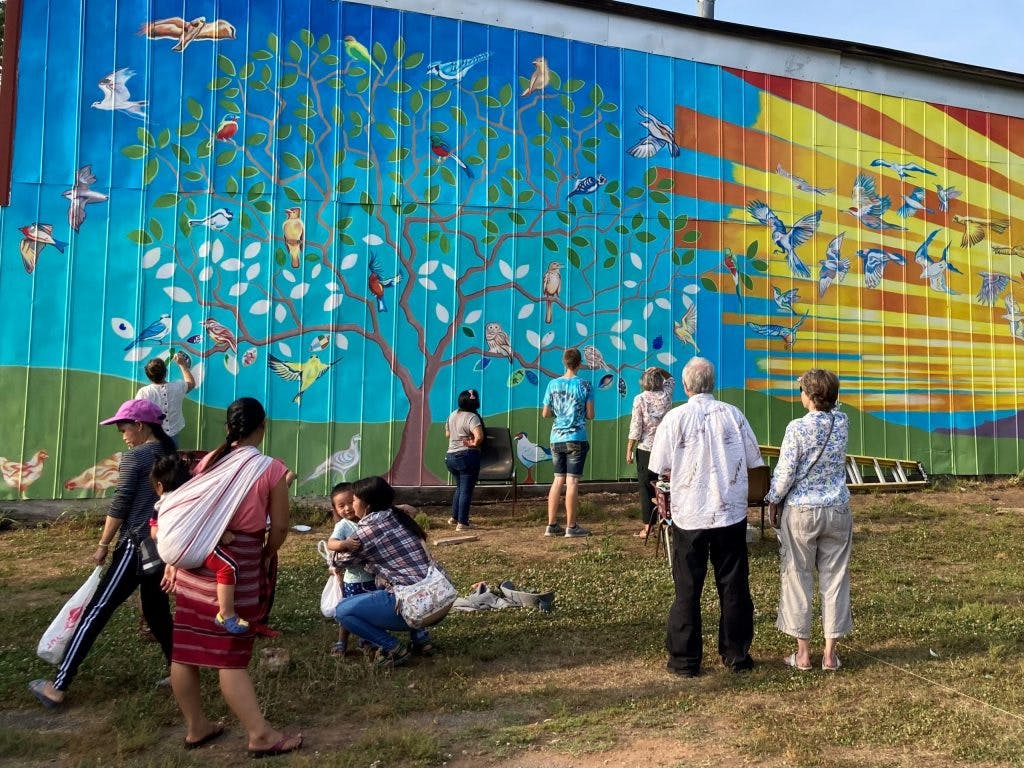I had the joy of spending a few days in Georgia this week. If you follow the news, you know this about Georgia: on Tuesday the state elected Raphael Warnock in a runoff, expanding the Senate’s Democrat majority.
But that’s not what I’m writing about.
In fact, I’ve been meaning to explain why I don’t write much about news stories at all. If a news story comes and goes and I have not posted my thoughts on it, it’s not that I don’t care, or that the news story didn’t matter to someone or even to many, many someones. That’s just not my project now. Here’s why.
|
Residents of a small Georgian town prepare a wall for a mural. |
First, there’s no shortage of news commentary elsewhere. My aim is to help you learn about socioeconomic and racial justice, and for many people, reading news is the only time to think about society beyond immediate acquaintances. Our learning about justice can end up so focused on news that all we do is respond in prescribed ways to news stories. But that’s not enough.
News stories do have real effects on lives—the emotions we feel are real, and sometimes news does reflect wider trends in society. But what we often forget is that news stories are not the equivalent of life itself. They are written to keep news agencies earning money, and often they do that by fostering fear and outrage to garner clicks. Justice happens in more than an inflamed tweet.
For instance, here’s what else I saw happening in Georgia this week.
In a town of just 1,500 people, several hundred gathered for a Christmas parade. This year baton twirlers in the parade spun batons, not rifles. This put at least one Asian American bystander at greater ease than usual, especially after he’d seen T-shirts in town with slogans like “Bullets are faster than 911.”
Folks in the crowd recalled with pride a few years earlier when several dozen Karen refugees from Northern Burma led the parade with a big sign reading “Joy to the World.” In a rural Southern county where slogans of wall-building are all over the news, this town has reorganized itself to welcome hundreds of immigrants. Rural Georgians have hired ESL teachers, donated a church building, learned new customs, and formed an after-school youth center.
The following night people gathered in the cold and darkness around the town Christmas tree to sing and light candles. One huddle of youth whose first languages included Spanish, English, and Karen shared a giggle over a stray cat that upstaged the local preacher in his welcome speech. This gathering of people of different races and languages came together because of five years of prayer and hard work by a multiracial group of ordinary citizens who decided not to put up with a redlining incident in their town.
And also this weekend, a 66-year-old man who was the first Black person elected to the town’s City Council sat down with me, a stranger from the north, to explain why his campaign slogan was “every good work is patient.”
In this newsletter I refuse to be dictated by news because good work takes patience. That may cost me subscribers. The algorithms that drive our information, conversations, politics, and very lives gravitate toward what’s being shared by as many people as possible, and that means knee-jerk reactionary news. For years I have focused my energy on writing books instead of blogs because books are designed around slower rhythms of interest. I’m working on a book again, and this newsletter is a way to put a similar long spread of learning into weekly format. We need to do proactive, patient work together.
You’ve found your way here, and I thank you. Slow down. Take a breath. Relax your scrolling fingers long enough to let something sink in.
|
|
P.S. A few weeks ago I gave you permission to go talk to someone you want to learn from. How’s it going?
|
The mural near completion. Photo from mural artist Tracy Newton. Read more about the town and the mural here. |

